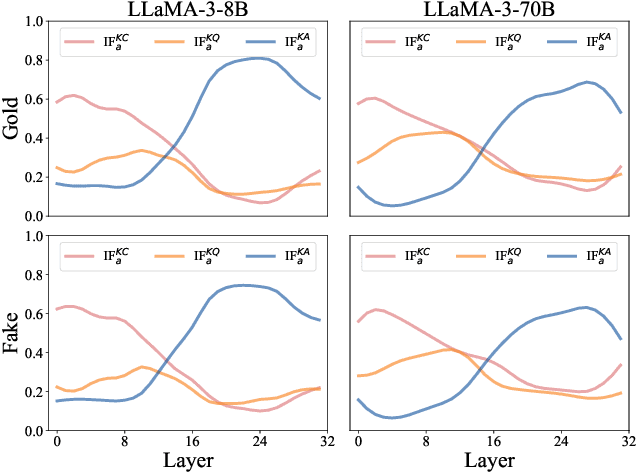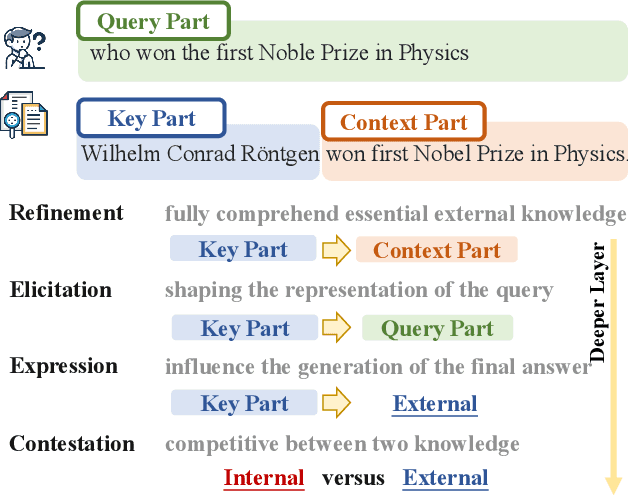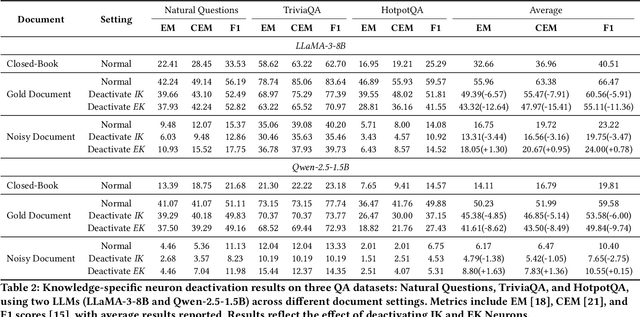Ruiyang Ren
STARec: An Efficient Agent Framework for Recommender Systems via Autonomous Deliberate Reasoning
Aug 26, 2025Abstract:While modern recommender systems are instrumental in navigating information abundance, they remain fundamentally limited by static user modeling and reactive decision-making paradigms. Current large language model (LLM)-based agents inherit these shortcomings through their overreliance on heuristic pattern matching, yielding recommendations prone to shallow correlation bias, limited causal inference, and brittleness in sparse-data scenarios. We introduce STARec, a slow-thinking augmented agent framework that endows recommender systems with autonomous deliberative reasoning capabilities. Each user is modeled as an agent with parallel cognitions: fast response for immediate interactions and slow reasoning that performs chain-of-thought rationales. To cultivate intrinsic slow thinking, we develop anchored reinforcement training - a two-stage paradigm combining structured knowledge distillation from advanced reasoning models with preference-aligned reward shaping. This hybrid approach scaffolds agents in acquiring foundational capabilities (preference summarization, rationale generation) while enabling dynamic policy adaptation through simulated feedback loops. Experiments on MovieLens 1M and Amazon CDs benchmarks demonstrate that STARec achieves substantial performance gains compared with state-of-the-art baselines, despite using only 0.4% of the full training data.
BEE-RAG: Balanced Entropy Engineering for Retrieval-Augmented Generation
Aug 07, 2025



Abstract:With the rapid advancement of large language models (LLMs), retrieval-augmented generation (RAG) has emerged as a critical approach to supplement the inherent knowledge limitations of LLMs. However, due to the typically large volume of retrieved information, RAG tends to operate with long context lengths. From the perspective of entropy engineering, we identify unconstrained entropy growth and attention dilution due to long retrieval context as significant factors affecting RAG performance. In this paper, we propose the balanced entropy-engineered RAG (BEE-RAG) framework, which improves the adaptability of RAG systems to varying context lengths through the principle of entropy invariance. By leveraging balanced context entropy to reformulate attention dynamics, BEE-RAG separates attention sensitivity from context length, ensuring a stable entropy level. Building upon this, we introduce a zero-shot inference strategy for multi-importance estimation and a parameter-efficient adaptive fine-tuning mechanism to obtain the optimal balancing factor for different settings. Extensive experiments across multiple RAG tasks demonstrate the effectiveness of BEE-RAG.
Reinforced Informativeness Optimization for Long-Form Retrieval-Augmented Generation
May 27, 2025Abstract:Long-form question answering (LFQA) presents unique challenges for large language models, requiring the synthesis of coherent, paragraph-length answers. While retrieval-augmented generation (RAG) systems have emerged as a promising solution, existing research struggles with key limitations: the scarcity of high-quality training data for long-form generation, the compounding risk of hallucination in extended outputs, and the absence of reliable evaluation metrics for factual completeness. In this paper, we propose RioRAG, a novel reinforcement learning (RL) framework that advances long-form RAG through reinforced informativeness optimization. Our approach introduces two fundamental innovations to address the core challenges. First, we develop an RL training paradigm of reinforced informativeness optimization that directly optimizes informativeness and effectively addresses the slow-thinking deficit in conventional RAG systems, bypassing the need for expensive supervised data. Second, we propose a nugget-centric hierarchical reward modeling approach that enables precise assessment of long-form answers through a three-stage process: extracting the nugget from every source webpage, constructing a nugget claim checklist, and computing rewards based on factual alignment. Extensive experiments on two LFQA benchmarks LongFact and RAGChecker demonstrate the effectiveness of the proposed method. Our codes are available at https://github.com/RUCAIBox/RioRAG.
SimpleDeepSearcher: Deep Information Seeking via Web-Powered Reasoning Trajectory Synthesis
May 22, 2025



Abstract:Retrieval-augmented generation (RAG) systems have advanced large language models (LLMs) in complex deep search scenarios requiring multi-step reasoning and iterative information retrieval. However, existing approaches face critical limitations that lack high-quality training trajectories or suffer from the distributional mismatches in simulated environments and prohibitive computational costs for real-world deployment. This paper introduces SimpleDeepSearcher, a lightweight yet effective framework that bridges this gap through strategic data engineering rather than complex training paradigms. Our approach synthesizes high-quality training data by simulating realistic user interactions in live web search environments, coupled with a multi-criteria curation strategy that optimizes the diversity and quality of input and output side. Experiments on five benchmarks across diverse domains demonstrate that SFT on only 871 curated samples yields significant improvements over RL-based baselines. Our work establishes SFT as a viable pathway by systematically addressing the data-scarce bottleneck, offering practical insights for efficient deep search systems. Our code is available at https://github.com/RUCAIBox/SimpleDeepSearcher.
Unveiling Knowledge Utilization Mechanisms in LLM-based Retrieval-Augmented Generation
May 17, 2025



Abstract:Considering the inherent limitations of parametric knowledge in large language models (LLMs), retrieval-augmented generation (RAG) is widely employed to expand their knowledge scope. Since RAG has shown promise in knowledge-intensive tasks like open-domain question answering, its broader application to complex tasks and intelligent assistants has further advanced its utility. Despite this progress, the underlying knowledge utilization mechanisms of LLM-based RAG remain underexplored. In this paper, we present a systematic investigation of the intrinsic mechanisms by which LLMs integrate internal (parametric) and external (retrieved) knowledge in RAG scenarios. Specially, we employ knowledge stream analysis at the macroscopic level, and investigate the function of individual modules at the microscopic level. Drawing on knowledge streaming analyses, we decompose the knowledge utilization process into four distinct stages within LLM layers: knowledge refinement, knowledge elicitation, knowledge expression, and knowledge contestation. We further demonstrate that the relevance of passages guides the streaming of knowledge through these stages. At the module level, we introduce a new method, knowledge activation probability entropy (KAPE) for neuron identification associated with either internal or external knowledge. By selectively deactivating these neurons, we achieve targeted shifts in the LLM's reliance on one knowledge source over the other. Moreover, we discern complementary roles for multi-head attention and multi-layer perceptron layers during knowledge formation. These insights offer a foundation for improving interpretability and reliability in retrieval-augmented LLMs, paving the way for more robust and transparent generative solutions in knowledge-intensive domains.
Holistically Guided Monte Carlo Tree Search for Intricate Information Seeking
Feb 07, 2025



Abstract:In the era of vast digital information, the sheer volume and heterogeneity of available information present significant challenges for intricate information seeking. Users frequently face multistep web search tasks that involve navigating vast and varied data sources. This complexity demands every step remains comprehensive, accurate, and relevant. However, traditional search methods often struggle to balance the need for localized precision with the broader context required for holistic understanding, leaving critical facets of intricate queries underexplored. In this paper, we introduce an LLM-based search assistant that adopts a new information seeking paradigm with holistically guided Monte Carlo tree search (HG-MCTS). We reformulate the task as a progressive information collection process with a knowledge memory and unite an adaptive checklist with multi-perspective reward modeling in MCTS. The adaptive checklist provides explicit sub-goals to guide the MCTS process toward comprehensive coverage of complex user queries. Simultaneously, our multi-perspective reward modeling offers both exploration and retrieval rewards, along with progress feedback that tracks completed and remaining sub-goals, refining the checklist as the tree search progresses. By striking a balance between localized tree expansion and global guidance, HG-MCTS reduces redundancy in search paths and ensures that all crucial aspects of an intricate query are properly addressed. Extensive experiments on real-world intricate information seeking tasks demonstrate that HG-MCTS acquires thorough knowledge collections and delivers more accurate final responses compared with existing baselines.
RAG-Star: Enhancing Deliberative Reasoning with Retrieval Augmented Verification and Refinement
Dec 17, 2024



Abstract:Existing large language models (LLMs) show exceptional problem-solving capabilities but might struggle with complex reasoning tasks. Despite the successes of chain-of-thought and tree-based search methods, they mainly depend on the internal knowledge of LLMs to search over intermediate reasoning steps, limited to dealing with simple tasks involving fewer reasoning steps. In this paper, we propose \textbf{RAG-Star}, a novel RAG approach that integrates the retrieved information to guide the tree-based deliberative reasoning process that relies on the inherent knowledge of LLMs. By leveraging Monte Carlo Tree Search, RAG-Star iteratively plans intermediate sub-queries and answers for reasoning based on the LLM itself. To consolidate internal and external knowledge, we propose an retrieval-augmented verification that utilizes query- and answer-aware reward modeling to provide feedback for the inherent reasoning of LLMs. Our experiments involving Llama-3.1-8B-Instruct and GPT-4o demonstrate that RAG-Star significantly outperforms previous RAG and reasoning methods.
Self-Calibrated Listwise Reranking with Large Language Models
Nov 07, 2024



Abstract:Large language models (LLMs), with advanced linguistic capabilities, have been employed in reranking tasks through a sequence-to-sequence approach. In this paradigm, multiple passages are reranked in a listwise manner and a textual reranked permutation is generated. However, due to the limited context window of LLMs, this reranking paradigm requires a sliding window strategy to iteratively handle larger candidate sets. This not only increases computational costs but also restricts the LLM from fully capturing all the comparison information for all candidates. To address these challenges, we propose a novel self-calibrated listwise reranking method, which aims to leverage LLMs to produce global relevance scores for ranking. To achieve it, we first propose the relevance-aware listwise reranking framework, which incorporates explicit list-view relevance scores to improve reranking efficiency and enable global comparison across the entire candidate set. Second, to ensure the comparability of the computed scores, we propose self-calibrated training that uses point-view relevance assessments generated internally by the LLM itself to calibrate the list-view relevance assessments. Extensive experiments and comprehensive analysis on the BEIR benchmark and TREC Deep Learning Tracks demonstrate the effectiveness and efficiency of our proposed method.
REAR: A Relevance-Aware Retrieval-Augmented Framework for Open-Domain Question Answering
Feb 27, 2024



Abstract:Considering the limited internal parametric knowledge, retrieval-augmented generation (RAG) has been widely used to extend the knowledge scope of large language models (LLMs). Despite the extensive efforts on RAG research, in existing methods, LLMs cannot precisely assess the relevance of retrieved documents, thus likely leading to misleading or even incorrect utilization of external knowledge (i.e., retrieved documents). To address this issue, in this paper, we propose REAR, a RElevance-Aware Retrieval-augmented approach for open-domain question answering (QA). As the key motivation, we aim to enhance the self-awareness of source relevance for LLMs, so as to adaptively utilize external knowledge in RAG systems. Specially, we develop a new architecture for LLM based RAG system, by incorporating a specially designed rank head that precisely assesses the relevance of retrieved documents. Furthermore, we propose an improved training method based on bi-granularity relevance fusion and noise-resistant training. By combining the improvements in both architecture and training, our proposed REAR can better utilize external knowledge by effectively perceiving the relevance of retrieved documents. Experiments on four open-domain QA tasks show that REAR significantly outperforms previous a number of competitive RAG approaches. Our code and data can be accessed at https://github.com/RUCAIBox/REAR.
BASES: Large-scale Web Search User Simulation with Large Language Model based Agents
Feb 27, 2024



Abstract:Due to the excellent capacities of large language models (LLMs), it becomes feasible to develop LLM-based agents for reliable user simulation. Considering the scarcity and limit (e.g., privacy issues) of real user data, in this paper, we conduct large-scale user simulation for web search, to improve the analysis and modeling of user search behavior. Specially, we propose BASES, a novel user simulation framework with LLM-based agents, designed to facilitate comprehensive simulations of web search user behaviors. Our simulation framework can generate unique user profiles at scale, which subsequently leads to diverse search behaviors. To demonstrate the effectiveness of BASES, we conduct evaluation experiments based on two human benchmarks in both Chinese and English, demonstrating that BASES can effectively simulate large-scale human-like search behaviors. To further accommodate the research on web search, we develop WARRIORS, a new large-scale dataset encompassing web search user behaviors, including both Chinese and English versions, which can greatly bolster research in the field of information retrieval. Our code and data will be publicly released soon.
 Add to Chrome
Add to Chrome Add to Firefox
Add to Firefox Add to Edge
Add to Edge